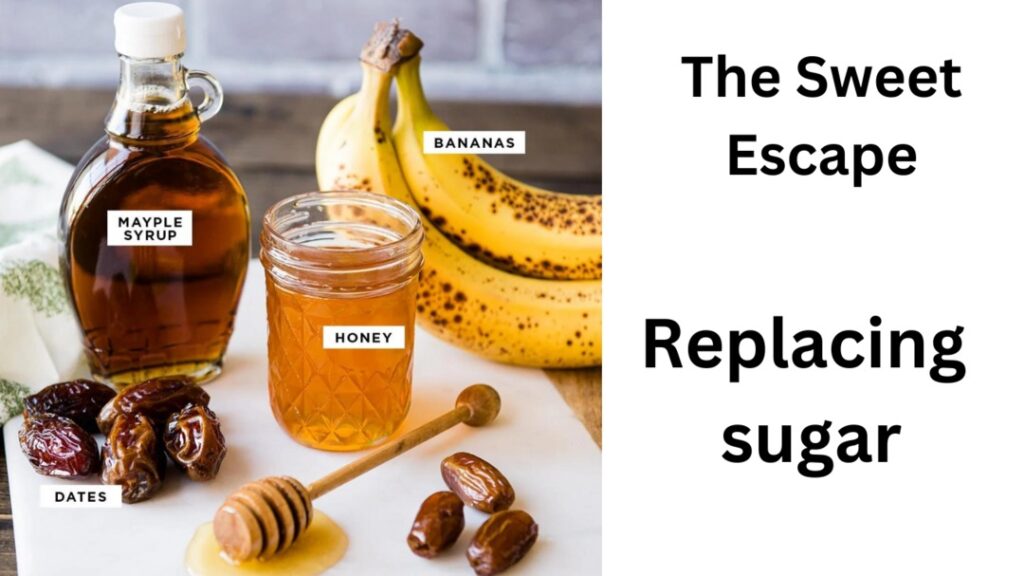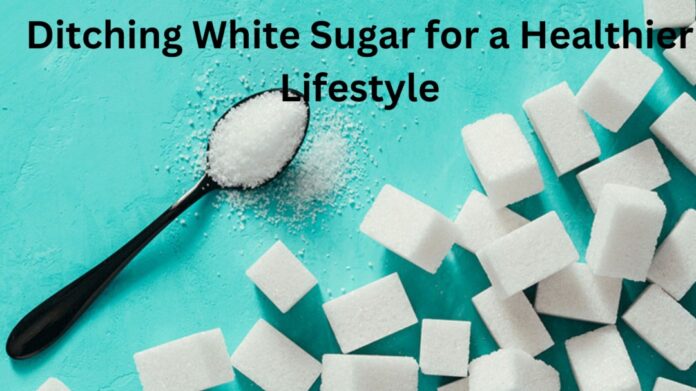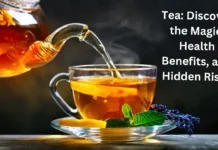Is White Sugar is healthy ? In the realm of dietary villains, white sugar often takes center stage. Its ubiquity in processed foods and beverages has contributed to a widespread addiction, leading to various health issues.
But fear not, for there are numerous ways to kick the sugar habit and embrace a healthier lifestyle. In this article, we’ll explore the detrimental effects of sugar intake, strategies to replace sugary foods, and the myriad benefits of doing so. Let’s learn how to escape sweet : ditching white sugar for a healthier lifestyle.
The Bitter Truth about White Sugar:

White sugar, also known as sucrose, is a refined carbohydrate extracted from sugarcane or sugar beets. While it provides a quick source of energy, its consumption comes with a host of negative consequences for our health.
Weight Gain: One of the most well-documented effects of excessive sugar intake is weight gain. Sugary foods and beverages are calorie-dense but nutrient-poor, leading to an imbalance in energy consumption and expenditure.
Increased Risk of Chronic Diseases: High sugar consumption has been linked to various chronic diseases, including type 2 diabetes, heart disease, and certain types of cancer.
It can contribute to insulin resistance, inflammation, and oxidative stress, all of which play a role in the development of these conditions.
Dental Decay: Sugar is a primary culprit in the development of dental caries (cavities). Bacteria in the mouth feed on sugar, producing acids that erode tooth enamel and lead to decay.
Energy Crashes and Mood Swings: While sugar provides a temporary energy boost, it is often followed by a crash in blood sugar levels, leading to fatigue, irritability, and mood swings.
Replacing Sugar: The Sweet Escape: Ditching White Sugar for a Healthier Lifestyle

Fortunately, there are plenty of alternatives to white sugar that can satisfy our sweet cravings without wreaking havoc on our health. Here are some healthier options:
Natural Sweeteners: The Sweet Escape: Ditching White Sugar for a Healthier Lifestyle
Honey: Rich in antioxidants and minerals, honey offers a natural sweetness with added nutritional benefits. It has antibacterial properties and can help soothe sore throats and coughs.
Maple Syrup: Made from the sap of maple trees, maple syrup is a delicious alternative to sugar. It contains antioxidants and minerals like manganese and zinc, which support immune function and reduce inflammation.
Stevia: Derived from the leaves of the Stevia rebaudiana plant, stevia is a calorie-free sweetener that does not raise blood sugar levels. It is much sweeter than sugar, so only a small amount is needed.
Whole Fruits: The Sweet Escape: Ditching White Sugar for a Healthier Lifestyle
Dates: Naturally sweet and high in fiber, dates can be used as a natural sweetener in baking or blended into smoothies.
Bananas: Ripe bananas add sweetness and moisture to recipes like oatmeal, pancakes, and baked goods. They also provide potassium, vitamin C, and other nutrients.
Berries: Berries like strawberries, blueberries, and raspberries are low in sugar and high in fiber, antioxidants, and vitamins. They make a delicious topping for yogurt, oatmeal, or desserts.
Unrefined Sugars: The Sweet Escape: Ditching White Sugar for a Healthier Lifestyle
Coconut Sugar: Made from the sap of coconut palm trees, coconut sugar is less processed than white sugar and contains small amounts of nutrients like iron, zinc, and antioxidants.
Molasses: Rich in minerals like iron, calcium, and magnesium, molasses is a byproduct of the sugar refining process. It has a strong flavor and can be used in baking or as a sweetener in savory dishes.
Benefits of Sugar Replacement:

Making the switch from white sugar to healthier alternatives offers a multitude of benefits for our health and well-being:
Stable Blood Sugar Levels: Unlike white sugar, which causes rapid spikes and crashes in blood sugar levels, natural sweeteners and unrefined sugars provide a more gradual and sustained source of energy.
Reduced Risk of Chronic Diseases: By cutting back on sugar intake, we can lower our risk of developing chronic diseases such as type 2 diabetes, heart disease, and obesity.
Improved Dental Health: Choosing sugar-free or low-sugar alternatives can help protect our teeth from decay and maintain optimal oral hygiene.
Better Mood and Energy Levels: Steady blood sugar levels contribute to stable energy levels and mood, reducing the likelihood of energy crashes and mood swings.
Enhanced Nutritional Intake: Many natural sweeteners and unrefined sugars contain beneficial nutrients such as antioxidants, vitamins, and minerals, providing added nutritional value to our diet.
In conclusion, reducing our consumption of white sugar and opting for healthier alternatives is a simple yet powerful step towards improving our overall health and well-being.
By making mindful choices about the foods we eat, we can enjoy the sweetness of life without compromising our health.
Why should I consider replacing white sugar in my diet?
White sugar is linked to various health issues, including weight gain, diabetes, heart disease, and dental decay. Replacing it with healthier alternatives can help reduce these risks and improve overall well-being.
What are some common alternatives to white sugar?
Natural sweeteners like honey, maple syrup, and stevia are popular alternatives. Whole fruits such as dates, bananas, and berries can also be used to add sweetness to recipes. Additionally, unrefined sugars like coconut sugar and molasses offer alternative options.
How do I know which alternative sweetener to choose?
The choice of sweetener depends on personal preference, dietary restrictions, and intended use. Some sweeteners, like honey and maple syrup, have distinct flavors that may complement certain dishes, while others, like stevia, are more neutral in taste.
Will using alternative sweeteners affect the taste of my food?
Alternative sweeteners may impart different flavors to your dishes compared to white sugar. Experimentation is key to finding the right balance and flavor profile for your taste preferences.
Are alternative sweeteners healthier than white sugar?
While alternative sweeteners may offer some nutritional benefits compared to white sugar, such as antioxidants and minerals, they should still be consumed in moderation. Excessive intake of any sweetener can contribute to health issues.
Can I use alternative sweeteners in baking and cooking?
Yes, many alternative sweeteners can be used in baking and cooking as substitutes for white sugar. However, it’s important to note that some sweeteners may affect the texture and consistency of baked goods, so adjustments may be needed.
Will replacing white sugar with alternative sweeteners help me lose weight?
Cutting back on sugar intake, regardless of the source, can contribute to weight loss or weight management. However, it’s essential to consider overall dietary habits and lifestyle factors in achieving and maintaining a healthy weight.
Are there any side effects associated with alternative sweeteners?
Some people may experience digestive discomfort or allergic reactions to certain alternative sweeteners. It’s advisable to monitor your body’s response and consult with a healthcare professional if you have any concerns.
How can I gradually reduce my sugar intake?
Gradually reducing your consumption of sugary foods and beverages and gradually incorporating alternative sweeteners into your diet can help transition to a lower-sugar lifestyle. Focus on incorporating more whole foods and natural sources of sweetness.
Can I still enjoy sweet treats while reducing my sugar intake?
Yes, you can still enjoy sweet treats in moderation while reducing your sugar intake. Opt for homemade treats using alternative sweeteners and whole ingredients, and be mindful of portion sizes. Balancing indulgence with healthier choices is key to long-term success.





[…] the Importance of Immunity in Kids : Immunity Booster for […]